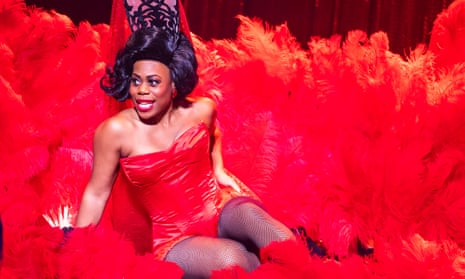Opera North’s post-pandemic return to full-scale opera for a live audience is a Carmen that’s as camp and colourful as they come, but also has a serious ambition. The director is Edward Dick, who staged Tosca here in 2018. His aim is to make Carmen the active heroine of her own opera, which is harder than it sounds given the many male gazes – of novelist, librettists, composer – through which she’s imagined.
We’re somewhere in the US, at a seedy club where the local garrison hang out, all bead curtains and glitterballs in Colin Richmond’s designs. It’s a long way from the cliched Spain of Bizet’s original, although Chrystal E Williams, who gives a magnetic and beautifully sung performance in the title role, still gets to show off her castanet skills.

As La Carmencita, Williams is the bar’s lead attraction. Descending on a swing in a scarlet Playboy bunny outfit and surrounded by fluttering ostrich-feather fans, she sings the habanera almost as a send-up, and her “prends garde” is more tease than threat. But backstage, with her wig off, she is Carmen, looking for a father for the daughter this production invents for her. Why she zeroes in on scruffy Don José is anyone’s guess. He’s already running away from a heavily pregnant Micaëla - whose first scene, in which she’s harassed by a roomful of men in uniform, is right now even more unsettling to watch than usual. At the end it’s the women and their daughters who see the horror of what’s happening; the men are oblivious.
Does all this work? Yes and no. You can’t make this opera into a story of female agency without stretching its narrative fabric a bit thinly. But it doesn’t take itself too seriously, and it’s solidly cast: last-minute stand-in Erin Caves brings an incisive tenor to Don José, Phillip Rhodes is the testosterone-driven Escamillo – either a rodeo rider or a country and western singer, perhaps both – and Camila Titinger’s soft-toned Micaëla has power where it counts. Garry Walker gets his music directorship off to a good start, whipping the orchestra through Bizet’s glorious tunes and getting real richness from the strings especially. The Toreador March in the final act is a line dance for a company chorus who don’t sound rusty in the slightest, led by Nando Messias’s gender-crossing Lillas Pastia with a 1,000-watt smile that says it’s good to be back.
Carmen is at Leeds Grand theatre until 28 October, then touring until 2 April.

Comments (…)
Sign in or create your Guardian account to join the discussion